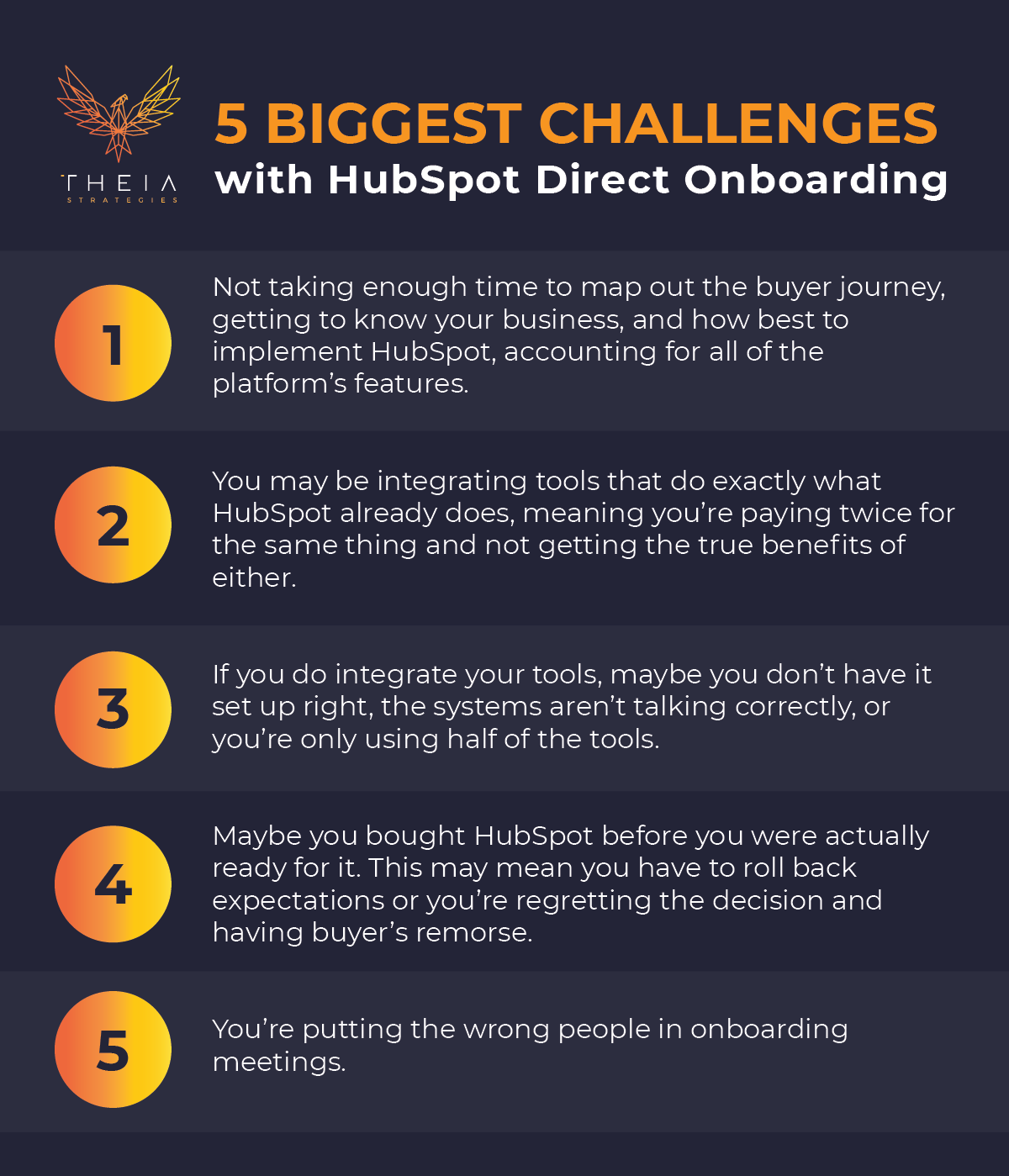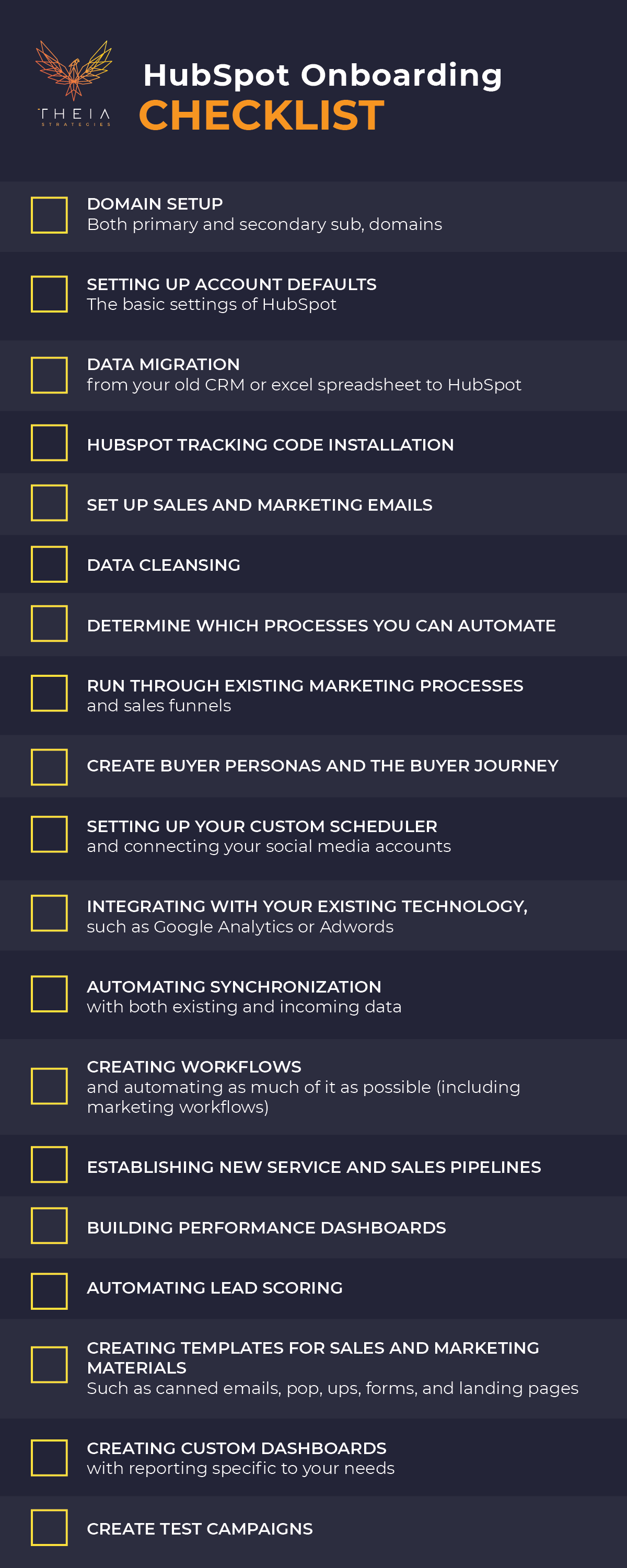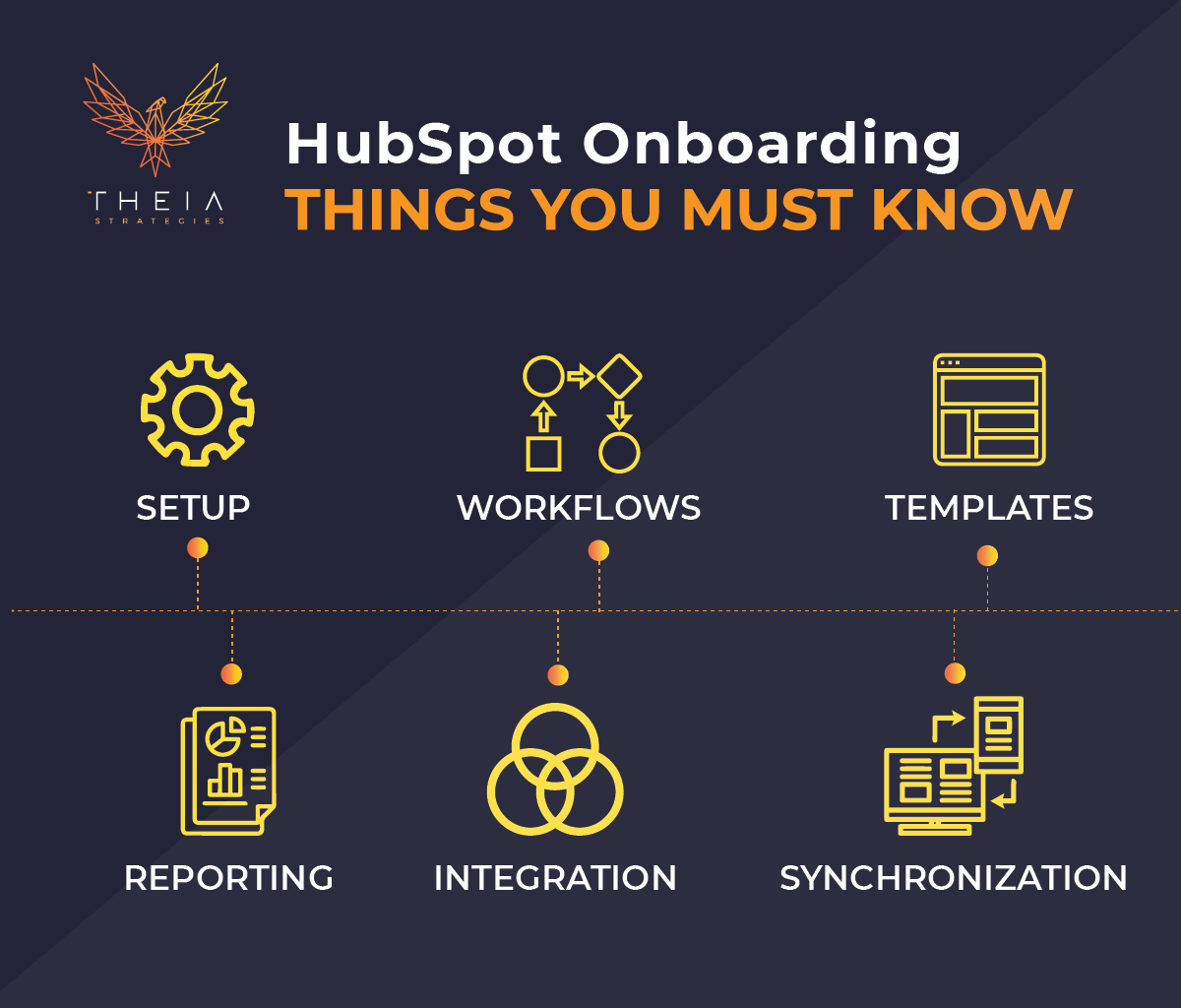
HubSpot onboarding is mandatory, but you still have options such as a HubSpot partner agency. Determine which is right for your business with this guide.
Do you need to purchase HubSpot onboarding?
Is it mandatory, or can you do it yourself?
What does it entail?
What’s the difference between a HubSpot agency partner (or onboarding service) and onboarding directly with HubSpot?
First, congratulations! You’ve realized that HubSpot can eliminate the excess apps and integrations and the consequential coordination and data integrity issues, not to mention boost your sales team’s efficiency.
But you have a lot of questions, and you can’t make a purchasing decision before you’ve answered them.
That’s why, in this article, we’re breaking down why you need HubSpot onboarding services (it’s mandatory, but that’s not the only reason you need it), what it entails, why HubSpot direct onboarding doesn’t work for all companies, and what a HubSpot partner agency can solve.
Yeah, you don’t really have a choice if you’ve purchased (or plan to purchase) a HubSpot Professional or Enterprise account. You have to go through onboarding.
But you don’t necessarily have to purchase onboarding directly through HubSpot. You can work with a HubSpot agency partner.
The real question though, is why you need HubSpot onboarding at all.
It may be mandatory, but HubSpot onboarding is also completely necessary. There are simply too many features, too many nuances, and migrating all your data isn’t that easy.
Actually, we find that it’s one of the biggest challenges for most of our clients before they sign with us. But there are plenty of other reasons you need onboarding, and why trying to onboard yourself can lead to big losses.
Trying to onboard to HubSpot yourself is like trying to redesign your business plan alone without having any experience in it.
Why is it so complicated?
Because you’re actually optimizing several systems within your organization. It doesn’t just affect sales. It affects marketing, customer service, web design, and even product development. Not to mention you’re adding layers of automation to your business.
So while HubSpot has made it as easy as possible to set up and use their platform, this is no easy task.
Because of that, set up mistakes are common and plentiful.
Some of the most common mistakes we see (even with those who do their onboarding directly through HubSpot’s 90, day onboarding process), include:
HubSpot is one of those tools that are designed to be easy to use, but it’s not exactly ready to use as soon as you open your account. You have to build it all out. You have to know exactly what you need and how HubSpot can solve that.

Now that you know why you really shouldn’t try to onboard with HubSpot yourself, you might be wondering whether HubSpot direct onboarding is the choice for you.
They do as much as they can to help you get to know their platform, with onboarding resources like:
Still, it can be such a challenge to know which resources you actually need, and navigating through it all can be even more difficult.
What does HubSpot direct onboarding look like?
Your experience with HubSpot onboarding will depend on which plan you purchase. That said, you’re generally paired with a HubSpot implementation specialist for 90 days after signing up.
They’ll provide you with general training on how to set up and use HubSpot, as well as tour you through all of the available features.
They’ll even advise you on which integrations are likely best for your business, and provide ongoing support until those 90 days are up.
In that time, they’ll walk you through setting up your first marketing campaign in HubSpot, and that’s generally the point when they deem you trained.
While they do provide all of this wonderful support, there are still things you’re going to be held accountable for on your own, such as:
Remember, your implementation specialist works like a consultant. They can’t do the work for you, and they aren’t going to have enough time to get to know your business thoroughly enough to know what will work for you specifically.
For small businesses, you may actually lose a lot of working bandwidth to this training process, and then to further learning after your 90 days with the implementation specialist.
For a HubSpot Pro account, the onboarding cost is a flat fee of $3,000. For a HubSpot Enterprise account, the flat fee for onboarding is $6,000.
This is a bit hefty, but considering it’s for 3 months of onboarding assistance with a HubSpot implementation specialist, it really pays for itself.
What you pay, though, generally comes down to what plan you choose. You could get free onboarding, or pay as little as $250 for your onboarding (for a starter package).
HubSpot will dedicate an implementation specialist to your company for up to 90 days (3 months), though you may run through their onboarding process much faster than that, depending on your needs.
The average partner agency program lasts 6 to 10 weeks, though it could be much longer, if necessary. But because these agencies set HubSpot up to work for you, rather than you learning how to to set it up for yourself, you generally move through onboarding a lot faster.
When an agency partners with HubSpot to deliver onboarding services, we actually have to hit certain key points in their onboarding training.
Meaning, there are just some things that every agency partner has to cover/ teach. In fact, each agency partner goes through extensive training and retraining on their own to ensure we actually cover these basics.
Every agency partner will differ in how they train you to use HubSpot, how long they’ll stay with you, and how much they charge.
But you’ll often find, with agencies like Theia, that the training is far more extensive and targeted. By the time you reach the end of training, you’ll have a greater grasp of each feature, how to use them to your advantage, and how to maintain this system.
Agencies like ours also work with other tools, and we tend to take our time getting to know the ins and outs of your business, develop buyer journeys with you, and even set up the integration with other tools for you (so you don’t have to even think about it).
In general, the process looks like this:
1. A kick, off, or discovery call
This typically involves:
2. Beginning the technical setup
This process could take a few weeks or longer, depending on your company and needs.
If you’ve already attempted to set up these systems on your own after HubSpot onboarding, and there are issues with the set up, it may lead to some minor delays.
This phase is all about:
These initial stages are the beginning of your automation journey, the start of eliminating all of those redundant tasks and updates.
3. Tying HubSpot to your existing CRM or migrating the data over
If your team is used to working a specific way, or with a specific platform, it isn’t always the best idea to force such a huge change (at least not right away).
In that case, HubSpot can and does integrate with basically every other CRM on the market. Meaning, you don’t have to switch if you don’t want to. By merging the two, they’ll simply have access to more sales and marketing tools.
That in mind, you don’t want to pay for two CRM tools, this would be the phase for migrating from one to the other.
If you don’t have an existing CRM, this is the phase where we’ll migrate your contacts and processes to create that functionality for you.
That’s the process of HubSpot set up through a partner agency (in a nutshell), but it doesn’t fully capture everything. It would take far too much to explain what the entire process looks like, especially because it can vary for every client (and agency partner).
Onboarding checklists aren’t necessarily vital, but they do tell you what to expect in an onboarding process and can help you make sure you’re reaching important milestones.
A HubSpot onboarding checklist may also help you identify which services may be the most important to your business before you start the process.
Either way, no matter which service you choose, you’ll want to cover the following:
The items in your checklist will vary based on your needs and what the partner agency provides, but this is a good framework to base your process understanding on.

It’s tempting to run through onboarding as quickly as possible, because it can be taxing and frustrating, especially if you’re doing much of the actual migration yourself.
But you won’t get anything out of it at all if you don’t take your time and follow some of this hardy advice.
Again, this is tempting, but you miss one single lesson and it could throw everything off. It’s essentially like missing the one screw that held the entire shelf together.
It’s pretty common to add managers to training such as HubSpot’s. The idea is that the manager will go on to teach everyone else how to use it. But this is rarely the case.
There’s just too much to learn. Too many features. Too many departments that HubSpot impacts.
If you can, add the people that will use HubSpot most to your onboarding training. This not only eliminates the need to train them later (and possibly lose out on a lot of valuable first, hand information), it also ensures they get a chance to ask questions and truly grasp the shifting technology.
Sit down with your team before you finish onboarding (and as early into the process as possible) to determine the structure of your repository, your folder structure, and your taxonomy or naming conventions.
You’d be surprised how quickly things can take off once you’re finished with onboarding, and if you’re not prepared for it, you’ll be flooded with documents and images before you’re organized.
This is no way to start off, and it’ll only cause inefficiencies and delays. Not ideal, to say the least.
Take this transition period as a time to optimize other areas of your sales, marketing, and customer service departments.
Think of it as spring cleaning. Find areas for automation. Eliminate redundancies and documents that don’t really matter. Too much red tape? Cut it out of your process.
You’ll easily lose track of forms in such a large automation system and with so many users and departments. It’s best to minimize the chaos as much as possible. It’ll only make your organization more efficient.
Coming in without expectations usually means you haven’t set any goals either.
Both are problematic.
So, set goals and expectations for onboarding with HubSpot.
One way to do that, is to read resources like the one you’re on now to see the process in full and understand your options.
Of course, you’re going to take the time to look around at all of your options, comparing rates, timelines, expertise, etc.
But there may be a few things you may miss while vetting each agency. Here are a few key details to add to your research:

Whether you’re onboarding with HubSpot directly or using a partner agency, the HubSpot Academy acts as a great supplement for building internal resources that you can use for training.
Not all of your employees will be involved in the initial onboarding for HubSpot, and you might lose valuable information without direct insights.
Retain some of the resources from HubSpot Academy, and any resources your partner agency may provide. You’ll need them to train existing employees as well as future hires.
(Theia Marketing provides direct and ongoing training to your sales reps, customer service staff, and marketing teams. If you believe you may need this, contact Theia Marketing for more information.)
You already know you have some options when it comes to onboarding with HubSpot, but how do HubSpot agency partners stack up against HubSpot direct onboarding?
And how do you know which option is best for your company?
It sounds a little strange to be comparing the two. After all, you’d think it’s better to get the training directly from the source, right?
Well, while HubSpot is a great solution for some, it may not be for everyone. Let’s take a look at the two together.
Getting your information directly from the source is a benefit in and of itself, but there are plenty more to be had.
Here are some of the biggest and most impactful benefits of HubSpot direct onboarding.
While the amount you pay for onboarding does vary with the plan you choose, you still know what you’re going to pay ahead of time. Pricing is consistent, transparent, and fairly reasonable for what you’re getting.
If you’re trying to determine the costs of your investment ahead of time, or are trying to gauge your ROI, this consistent pricing is pretty instrumental.
HubSpot onboarding generally takes 3 months to run through entirely, though you may finish sooner depending on your needs or how quickly you grasp HubSpot's features.
You know right from the start how long it will take to get up and running, and how long the migration could impact your business.
HubSpot provides you with an implementation specialist, and they’ll basically act as a consultant, telling you how to use the tools, informing you of the features, helping you set up templates, etc.
But you’re still the one that has to implement everything they’re teaching you.
This isn’t always advantageous, but it does have its upsides. For one, you’ll have more control over the process, and possibly a better understanding of the tools you’re using and the features available to you.
This works best for organizations that have someone within the company to own the process and make the connections. If not, they’re going to need extra help to maintain it.
We’ve already touched on the fact that, with direct onboarding, your organization has to implement the onboarding tasks yourself. Though you have a specialist, they aren’t going to be able to take the time to understand your business and direct needs.
In fact, a single HubSpot implementation specialist may be working with 70 clients at a time, or may defer many of their clients to onboarding services through partner agencies due to their high volume.
Essentially, they’re busy and their focus is divided. Of course, partner agencies have multiple clients as well, but they’ll generally have far, far fewer to deliver more personalized solutions and complete the migrations themselves (so you’ll get through onboarding faster).
But what other ways might direct onboarding with HubSpot not be the right solution for your company?
During your first onboarding meeting, the discovery and assessment phase, the onboarding specialist will create objectives for you to reach on your own.
They’ll tell you how, and give you the resources you need, but then leave you on your own to complete these objectives. They’ll meet with you every week for a 45-minute check-up.
It also won’t necessarily give you a play-by-play of every action you need to undertake.
After your 90 days are up, you’ll still have support as you continue to work through onboarding and understanding the HubSpot features, but you’ll have to call in to general customer support.
Like a lot of profitable businesses, HubSpot is always looking for ways to keep you with them and offer more services.
Yes, they want to deliver more tools, features, and generally help you automate and optimize functions within your business. But they also want you to upgrade your services. This isn’t unusual for any tool, by any means, but it isn’t always ideal when you’re just getting started.
If you’ve gone through the 90 days of onboarding, and still have questions on how to build sales funnels, buyer journeys, triggers, email templates, and other great functions within HubSpot… Well, you can get that help.
Yes, you can actually purchase additional training from HubSpot, including a face-to-face HubSpot consulting with one of their specialists for your whole team.
But you very likely won’t work with the same employee you’d been with during your traditional onboarding process.
This matters, because that specialist heard all of your concerns and questions, got to know your business a little bit, and learned where you were struggling. You’ll have to go through that “getting to know you” process all over again with a new specialist.
If you're a small team, it may be hard to maintain the onboarding and what was put together during that onboarding.
If you want to maintain or tweak or change things, you may not have the bandwidth to get it done. When working with an agency partner, getting something done is as easy as simply asking us to handle it for you.
You may need onboarding one way or the other, but, say you’ve signed up with HubSpot in the past and have already gone through their onboarding. You may already know the basics, or even the ins and outs.
By working with an agency partner for onboarding, you can choose your package and work with the agency to determine your real needs.
It may be as simple as migrating all of your data for you, to save you time. Or maybe it’s teaching you how to use specific features, or even identifying which features would work best for you.
An agency has the flexibility to dole out much more specific training. But that isn’t the only benefit.
Working with a partner agency is generally pricier, because it’s more personalized support, and they take the time to know your business, migrate the data for you (some, not all), and are available when you need them rather than once a week.
But you aren’t exactly set on one single pricing plan. You can work with the agency to determine what you really need, and select services based on their pricing, or even shop around various agencies.
HubSpot onboarding is set at 90 days, whether you need more time or not.
If you’re trying to reduce the impact of the slow integration on your business, you might be compelled to skip that 90 days.
An agency partner can help you do that, really, even if it wasn’t mandatory, we wouldn’t recommend DIY onboarding. HubSpot may give you the full suite of resources, but it would really slow your onboarding down.
An agency partner can shorten onboarding time because we do some of the processes for you, and because we’re tailoring the onboarding to your business.
We’re not going to go through an entire field of features that you aren’t going to use. We’re also not going to set objectives and let you go through the motions. We’re with you for each step, and within reach for every question.
With an agency partner, you’ll decide on the services you actually need, and work with your specialist to devise an onboarding plan.
You could finish your onboarding in as little as 6 weeks, or extend your onboarding to 6 months (or longer) if it’s necessary to truly grasp everything on your HubSpot account. But this is only possible when working with agencies outside of Hubspot.
Most HubSpot partner agencies are actually marketing agencies. See, we’ve figured out the ins and outs of HubSpot through our own marketing efforts, and realize that a lot of our clients can benefit from these optimizations.
So we’ve dedicated ourselves to optimizing all aspects of organizations that reach out to us, with the added benefit of knowing how all of those tools tie into your marketing.
Marketing, sales, and customer success are generally the departments that will use HubSpot, and where a CRM has the most impact, so it only makes sense to rope in that added knowledge.
Areas a partner agency can generally help:
One of the most complicated parts of setting up a HubSpot account, and where most companies go wrong during direct onboarding, is migrating data from one platform to HubSpot.
As you can imagine, it can get very messy (and expensive) to untangle an improper migration (not to mention there’s a great potential for data loss if you do this incorrectly).
A partner agency will migrate all of your data from one or multiple platforms into HubSpot and organize them into relevant categories and using custom properties.
We’d even integrate all of the extra tools, such as social media publishers, to make sure everything is set up correctly and functioning as it should.
This is not something that HubSpot does in its onboarding process.
While we’d love to say that an agency partner is right for every company trying to onboard with HubSpot, it isn’t necessarily true.
Here are a few considerations:
Because the range of services with agency partners varies so greatly, you really never know what you’re going to have to pay until you get a quote.
Most likely, you’ll have to spend a bit of time weighing options and quotes between services. This can extenuate the time it takes to get your onboarding rolling.
There have been plenty of companies that choose an agency partner for the sheer fact that the agency does everything from set up and migration to optimizing and day to day management.
Only, down the line, they realize that the agency has full control over their HubSpot account and no one else knows how to use it.
There’s a lot of convenience in having someone migrate and manage your HubSpot account, but make sure you’re working with an agency like Theia, that builds education into the onboarding.
It may be blatantly obvious which option is right for you, but in most cases, you’ll have to take some time to decide.
To help guide your decision making, ask yourself some of the following questions:
Naturally, there are far more questions to ask when trying to determine the right solution, but this is a good place to start.
HubSpot onboarding with a partner agency really should be an all-inclusive experience. Meaning, you should have total data migration and tool integration, as well as training in how to use HubSpot to its full means.
When you onboard with Theia Marketing, you’ll get all of the above and more, including:
Ready to start your HubSpot onboarding with a HubSpot partner agency? Reach out to us at Theia Marketing for our HubSpot onboarding services.